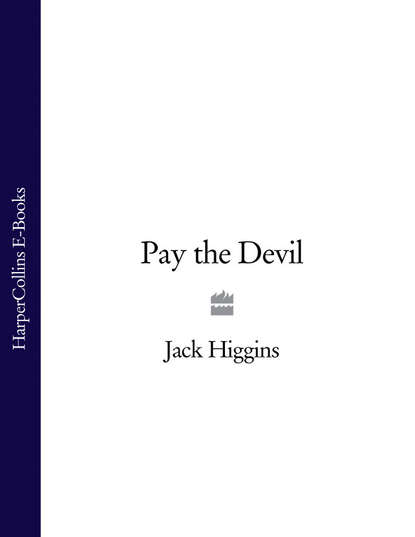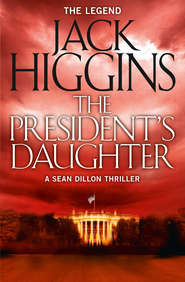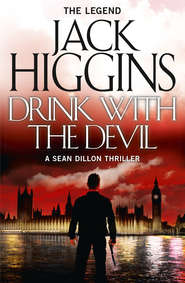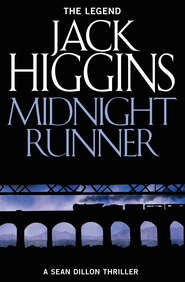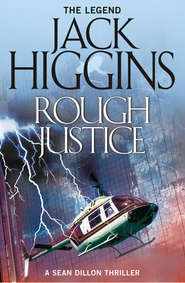По всем вопросам обращайтесь на: info@litportal.ru
(©) 2003-2024.
✖
Pay the Devil
Автор
Год написания книги
2018
Настройки чтения
Размер шрифта
Высота строк
Поля
Clay shrugged. ‘A Good Samaritan. She’ll declare herself in her own good time.’
Joshua lit the other lamp and illuminated the entire room. There were pictures on the wall, a carpet before the fireplace and comfortable chairs. There was an atmosphere of peace over everything, as if the man who lived here had been happy.
‘One thing’s for sure,’ Joshua said. ‘That man Burke didn’t know what he was talking about.’
Clay nodded. ‘I don’t think my uncle’s last days can have been too unpleasant.’
He took one of the lamps and crossed to a door in the far corner. It opened directly onto a flight of wooden stairs and he went up them quickly, Joshua at his heels carrying the other lamp. He opened the first door he came to and went in.
The room was small, but comfortably furnished as a bedroom, with a carpet on the floor. The mahogany wardrobe was empty and so were the drawers in the tallboy, but the blankets on the bed had recently been aired and the sheets and pillows were clean and white.
For no reason that he could put his finger on, he knew that this had been his uncle’s room, and for a moment he stood in silence by the window, staring out into the night, trying to form in his mind a picture of the man he had never seen.
There was a slight cough, and he turned to find Joshua standing in the doorway. ‘I’ve checked the other rooms, Colonel. There are five, all told. The room next door is furnished with a bed made up and ready for use. The others are empty.’
‘Then that takes care of both of us,’ Clay said. ‘Anything else along the corridor?’
Joshua shook his head. ‘Just a blank wall at the end.’
Clay led the way back downstairs. ‘I should say these were once the servants’ quarters. Presumably they were the only rooms fit for use after the fire.’
He crossed the kitchen to a door on the other side and tried to open it. It refused to budge and then he noticed the large key in the lock. He turned it quickly and the door opened without any further trouble. He was standing in a stone-flagged corridor that smelt cold and damp. Somewhere he could hear rain falling and he moved along the corridor, the lamp held out in front of him.
He mounted a short flight of stone steps and opened the door at the head of them. Immediately, he felt rain on his face and hastily placed one hand protectively over the open end of the lamp.
He was standing in what had obviously been the entrance hall of the house. A great stairway lifted into the darkness on his right and before him lay the scattered, dangerous mass of debris that had once been the roof and upper storey.
For a moment, the irony of the situation struck him. That seven hundred years of his family’s turbulent history should come to this and that he, the last of his name and born in an alien land, should stand among the ruins of a great house. A sudden gust of wind caused his lamp to flicker wildly and he turned back down the steps, closing the door behind him.
As he went back into the kitchen, Joshua came in from the courtyard, a bag in each hand. He placed them carefully on the floor and straightened. ‘I think you ought to have a look in the stables, Colonel,’ he said. ‘You’ll find something mighty interesting there.’
Clay followed him out into the courtyard. The stables lay on the other side, their great doors standing open to the night, and he saw that Joshua had taken the coach and horse into shelter. A lantern hung from a nail and Joshua lifted it down. ‘Over here, Colonel.’
There was a soft whinny from the darkness, and when Joshua raised the lantern, Clay saw a horse standing in one of the stalls. It was a beautiful animal, a black mare with a coat like satin. A thrill of conscious pleasure went through him as he gently ran his hand across its hindquarters.
‘Another gift from our Good Samaritan?’ Joshua said.
Clay smiled. ‘She can make this kind of gift any time she wants. That’s one of the finest bits of horseflesh I’ve ever seen.’
‘Things get more surprising round here minute by minute,’ Joshua said.
He replaced the lantern on its nail and started to unhitch the coach horse. Clay moved forward quickly. ‘I’ll see to that,’ he said. ‘You get a meal started.’
‘As you say, Colonel.’ Joshua pulled two more pieces of baggage out of the coach and walked across the courtyard to the house.
Clay took off his coat and unhitched the coach horse. He found an old blanket and gave the weary animal a rubdown. Afterwards, he led it into one of the stalls and gave it some of the oats and hay with which the black mare had been plentifully supplied.
The rain seemed to be slackening a little and he stood in the entrance and gazed out into the courtyard, breathing deeply, savouring the freshness. He was tired and his stomach craved food, but there was still something to be done. He pulled the leather travelling trunk out of the coach, hoisted it onto his broad shoulders and trudged across the courtyard through the rain.
He took the trunk straight up to his room. When he went downstairs again, a smell of cooking filled his nostrils. Joshua was bending over the fire, an iron frying pan in one hand.
‘Smells good, whatever it is,’ Clay said.
The man smiled cheerfully. ‘Ham and eggs and fried bread, Colonel. I’ll see what I can rustle up tomorrow when I’ve got the hang of the stove.’
‘We’ve dined on worse, and often,’ Clay said.
The bottle of brandy he had got at Cohan’s was standing on the table, which Joshua had made ready for the meal. Clay poured a generous measure into one of the cups and carried it to the fire.
He subsided into a chair with a groan of pleasure, booted legs outstretched. ‘Best part of the day, Colonel.’ Joshua grinned. ‘That’s what you always used to say on campaign.’
Clay swallowed some of the brandy. An expression of astonishment appeared on his face and he laughed and drank some more. ‘Something wrong, Colonel?’ Joshua asked.
Clay shook his head. ‘Things grow even more mysterious, that’s all. This is some of the finest French brandy I’ve ever tasted. Now where would a broken-down little country publican like Cohan get such stuff?’
‘I wouldn’t know, Colonel,’ Joshua said, as he ladled hot food onto two plates. ‘But one thing’s for sure. Ireland is no fit place for a gentleman.’
‘And Georgia is, I suppose?’ Clay grinned as he took his place at the table. ‘I don’t think the Irish would appreciate your sentiments. In fact if the crowd in that pub was a fair sample of the locals, I’d keep your observations to yourself if I were you. They reminded me strongly of Hood’s Texans.’
Joshua shuddered and sat down in the opposite chair. ‘Nobody on earth could resemble Hood’s Texans, Colonel, unless the Devil went to work in two places at the same time.’
They ate in silence, each concentrating on the heaped plate in front of him. After a while, Clay sat back with a sigh and reached for the brandy bottle. ‘Joshua, I always did say that where food is concerned, you’re a miracle worker.’
Joshua took the praise as his just reward. ‘True, Colonel, only it was your father who said it first. That’s why he hung on to me when everything else had to go in those bad years before the war, after your mother died. He always said he’d have been lost without me.’
‘And so would I,’ Clay assured him.
Joshua didn’t appear to consider the statement needed any contradiction, and busied himself with clearing the table as Clay went back to his seat by the fire and relaxed.
He sipped his brandy and stared into the flames, more tired than he had been in a long time. Gradually, his eyes closed and his head nodded forward. He took a deep breath, forced himself to his feet and yawned. ‘It’s been a long day. I think I’ll have an early night. There’ll be a lot to do tomorrow.’
‘I’ll bring your coffee at seven,’ Joshua told him, and Clay nodded, picked up one of the lamps and opened the door to the staircase.
It was cold in the bedroom. He placed the lamp on the small table beside the bed and opened the window. The rain had stopped and the darkness was perfumed, as a small wind lifted from the trees beyond the courtyard. He breathed deeply, inhaling the fragrance of the wet earth. Then the tiredness hit him again and he had barely sufficient strength to strip the clothes from his body and climb into bed. He blew out the lamp and the darkness moved in at once to welcome him.
Clay was not aware of coming awake, only of the fact that he was lying there and that moonlight drifted in through the window with opaque, white fingers.
For a little while he lay staring up at the ceiling, wondering what had caused him to awaken, and surprised to find that he no longer felt tired. He reached to the small table beside his bed and picked up the gold hunter. It was almost two o’clock, which meant that he had slept for no more than five hours. As he watched, the moonlight faded. He threw back the bedclothes and padded across the floor to the window.
It was a night to thank God for, the whole earth fresh after the rain. He stood there, his skin crawling with excitement, a small, restless wind touching his naked flesh. It was a quiet night, the only sound a dog barking several fields away. Then the bank of cloud rolled away from the moon and the countryside was bathed in a hard, white light. The sky was incredibly beautiful, with stars strung away to the horizon where the hills lifted uneasily to meet them.
At that moment, he became aware of another sound, a hollow drumming that was somehow familiar. As he leaned out of the window, a rider, etched against the sky, appeared from the trees beyond the courtyard and galloped along the rim of the valley where the moors began.
As he watched, the rider reined in his mount sharply so that it reared up on its hind legs. For a brief moment, the horse and rider were like a statue, completely immobile. Clay stared up toward them and suddenly, for no reason he could analyse, knew he was being watched. As he drew back quickly, a gay mocking laugh drifted down toward him and the horse snorted and leapt forward, as if the spurs had been applied, and disappeared over the rim of the valley.
Clay dressed hurriedly, his brain clear and cool. There had been too many mysteries already at Claremont; this was one he intended to solve. He went downstairs silently, boots in one hand, and paused in the kitchen to put them on. A moment later, he was crossing the courtyard to the stables.
He opened the door, allowing the moonlight to stream inside, and as he moved toward the black mare through the darkness, she whinnied softly as if she had been expecting him. He found a saddle and bridle hanging by the stall. They were of English make and lighter than he was used to, but he quickly led the animal out of her stall and saddled her.





